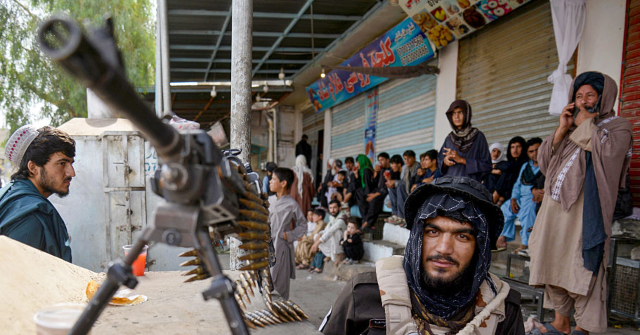Members of the Russia- and China-led Shanghai Cooperation Organization (SCO) emphasized their collective support for “development” and “reconstruction” of Afghanistan during their meeting this week, effectively confirming collaboration with the Taliban to enrich the country under the regime.
The SCO is a regional bloc consisting of Central and Southeast Asian countries created to address security concerns in the region. Afghanistan, under Taliban rule, is not an SCO member but does enjoy “observer” status. Tianjin, China, hosted this week’s SCO foreign minister summit, which concluded on Wednesday.
The foreign ministers of Russia, China, Pakistan, and India all addressed Afghanistan’s current status as an impoverished, war-torn nation led by a jihadist organization as a security concern for their borders. Their comments, as translated in multiple media outlets, did not address the Taliban by name, but all discussed investing in rebuilding the country and cooperating with its government.
The Taliban is the uncontested government of Afghanistan, returning to power in August 2021 after former President Joe Biden announced that he would violate an agreement brokered under predecessor and successor Donald Trump to withdraw American troops from the country after 20 years. In response to Biden’s change in policy, the Taliban launched tens of thousands of attacks on the Afghan military, destroying it entirely and sending then-President Ashraf Ghani fleeing.
Nearly four years later, only one nation on Earth, Russia, recognizes the Taliban as the government of Afghanistan. China and Iran interact with the Taliban as an alleged “interim” governing body, and while the United Nations does not allow the Taliban a formal delegation to represent Afghanistan in its various bodies, it invited the Taliban to its annual climate alarmism conference, COP29, in November.
Chinese Foreign Minister Wang Yi addressed Afghanistan in his remarks on Wednesday as an “important member of the SCO family” and encouraged neighboring states to invest in the country’s future, currently in the hands of the Taliban.
“Afghanistan is an important member of the SCO family. Efforts should be made to support Afghanistan’s reconstruction and development,” Wang said, according to the Chinese Foreign Ministry, “and address both symptoms and root causes to realize lasting peace and stability.”
Wang’s Russian counterpart, Sergey Lavrov, reportedly said in his remarks that the members of the group all agreed that they must play a role in helping the Taliban rebuild the country.
“There is a shared understanding among the members on the importance of supporting Afghanistan’s reconstruction and ensuring its sustainable development,” Lavrov declared, according to the Afghan outlet Tolo News. “Emphasis was placed on strengthening national consensus and guaranteeing ethnic and political inclusivity in governmental structures as key priorities.”
Lavrov reportedly said that development of Afghanistan must help it become “an independent, neutral, peaceful country free from terrorism and drug trafficking,” a challenging goal given that its current government is a terrorist dictatorship. Russia no longer recognizes the Taliban as a terrorist organization, however, stripping it of designated terrorist organization status in April. That decision paved the way for Russia to formally recognize the Taliban as the government of Afghanistan this month.
Indian External Affairs Minister S. Jaishankar also weighed in on the situation in Afghanistan at the SCO summit. While India has kept more of a distance from Taliban leaders than Russia or China, it maintains a clear interest in ensuring that jihadist terrorism does not spread beyond Afghanistan throughout the region, particularly in light of terrorist threats on northern India from Pakistan.
“The three evils that SCO was founded to combat were terrorism, separatism and extremism,” Jaishankar told the SCO in his remarks, demanding an “uncompromising” stance to eradicate terrorism.
“Afghanistan has been long on the SCO agenda. The compulsions of regional stability are buttressed by our longstanding concern for the well-being of the Afghan people,” he stated. “The international community, particularly SCO members, must therefore step up with development assistance. India, for its part, will certainly do so.”
Jaishankar did not distinguish aid for the Taliban from aid for “the Afghan people.”
Apparently absent from the conversation on Afghanistan at the SCO was any discussion of the International Criminal Court (ICC) case against the Taliban leadership. The ICC announced this month that it had issued two arrest warrants related to Afghanistan: one for “supreme leader” of the Taliban Hibatullah Akhundzada and one for top Taliban judge Abdul Hakim Haqqani. The ICC is seeking to prosecute those leaders in response to their extensive human rights atrocities against Afghan civilians, particularly women and girls.
“Specifically, the Taliban severely deprived, through decrees and edicts, girls and women of the rights to education, privacy and family life,” the ICC stated in their announcement, “and the freedoms of movement, expression, thought, conscience and religion.”
Taliban leaders did not deny the allegations of crimes against humanity against them, but rejected the idea that the group’s fundamentalist interpretation of Islamic law was criminal.
“Labeling the laws of Islamic Sharia as oppressive or against humanity, and threatening those who implement them with arrest and prosecution,” Taliban spokesman Zabihullah Mujahid said in response to the warrants, “is a clear expression of enmity and hatred toward the pure religion of Islam and its legal system, and it is an insult to the beliefs of all Muslims.”
Follow Frances Martel on Facebook and Twitter.
Read the full article here
